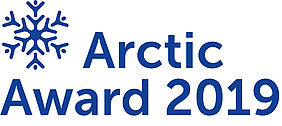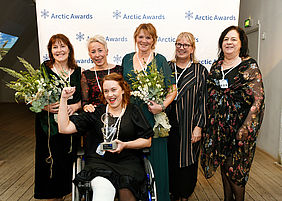The third edition of the competition was launched on 26th March 2019 and closed on 10th May 2019.
This annual project competition has been designed to highlight exceptional projects focusing on topics of particular relevance to the Arctic area. All the projects funded by five Arctic programmes - Northern Periphery & Arctic Programme, Interreg Botnia – Atlantica, Interreg Nord, Kolarctic CBC programmes, and Karelia CBC programme, were welcomed to participate.
The categories of the Arctic Award competition rotate yearly. This year´s categories were:
1. Arctic Entrepreneurial Spirit
2. Sustainable use of Resources
We thank all the projects for their contributions. It was not easy to choose a winner out of so many inspirational and innovative projects!
This year, for the first time, the Arctic Award ceremony has been a part of the Arctic Cooperation Conference – “What can cooperation do for Arctic” held in Copenhagen on 17th to 18th September 2019. The awards were handed out by Ambassador Jari Vilén, Senior Advisor in Arctic policy matters at the European Political Strategy Centre (EPSC) of the European Commission.
Based on the decision of the Judging Panel made out of representatives from all five Arctic programmes, the winners were chosen.
Category: Arctic Entrepreneurial Spirit
We are proud to announce that the winner of category “Arctic Entrepreneurial Spirit” is Our Stories – The Business of using storytelling to draw people in (Interreg NORD).
The winner of the category Arctic entrepreneurial spirit has demonstrated that it has direct benefits for the people living in Arctic regions, who are directly involved in the design of the solutions. It has also shown successful involvement of underrepresented groups, such as women, young people and indigenous peoples. The project has also been successful in energizing and innovating the Northern Lights Route, raising curiosity, and using common history to bring out the Arctic entrepreneurial spirit.
About Our Stories
Spreading through Finland, Sweden and Norway, the Northern Lights Route is an official tourism route since 2002. Despite its long existence, the route is not yet very popular and visited by tourists. It was the project´s objective to advance storytelling and story design and use these local stories to raise curiosity about people and common history in the area. The project created conditions so that stories and culture that exist along this route can be used for commercial purposes, which in turn strengthens the region´s attractiveness.
More than 400 people were involved in the project including local population, the business community and indigenous peoples´ minorities Sámi, Kven, and Mäenkieli. These minority cultures represented the keystone of the project. The project had developed a trademark of the route and published 108 stories in various forms (music, short film, oral storytelling, written text).
Partners: Lapland University of Applied Sciences (FI), Studio E-city Ky (FI), Ihana! AS (NO), JORD (SE), Sverigefinska folkhögskolan (SE/FI)
Category: Sustainable Use of Resources
We are proud to announce that the winner of category “Sustainable Use of Resources” is BuSK - Building shared knowledge capital to support natural resource governance in the northern periphery (Northern Periphery and Arctic),
The project has been awarded for showing direct benefits for the people living in Arctic regions. It has successfully disseminated best practice knowledge, and increased local acceptance and participation mechanisms in different nature-based industries, as well as it has combined indigenous and local knowledge into land use planning.
About Busk
Peripheral livelihoods and land use depend heavily on natural resources, but their management is often contested by various stakeholder interests. The BuSK project developed planning tools that enhanced the use of participatory techniques and gave assistance for decision makers concerning land use planning and natural resource governance. By involving all the stakeholders, the BuSK gave voice to indigenous communities, local residents and women.
The project provided valuable input in the recognition of reindeer herders´ needs in the planning of high-speed railway in Umeå (Sweden), collecting local knowledge for the establishment of the UNESCO heritage site in Greenland, evaluating local consequences of tourism growth in Iceland, Faroe Islands and Rovaniemi (Finland), and giving push for the establishment of cross-border management of protected areas in Finland and Norway.
Partners: Natural Resource Institute (FI), City of Rovaniemi (FI), Dimenteq (FI), Greenland Institute of Natural Resources (GL), Metsähallitus (FI), National University of Ireland Galway (IR), Qeqqata Municipality (GL), Swedish University of Agricultural Sciences (SE), The Arctic University of Norway (NO), University of Faroe Islands (FO), University of Iceland (IS), University of Lapland (FI)



